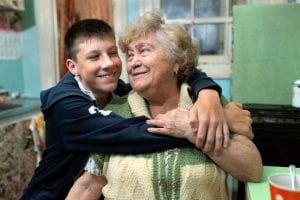 You have heard by now that teens in the U.S. are struggling with mental health more than ever before. A survey from the U.S. Centers for Disease Control and Prevention (CDC) conducted in 2021 found 44% of teens experienced feelings of sadness or hopelessness that prevented them from participating in normal activities. Almost 20% of teens said they had considered suicide, and 9% said they attempted suicide. Research finds these problems are more pronounced among lesbian, gay, and bisexual teens. [Read more…]
You have heard by now that teens in the U.S. are struggling with mental health more than ever before. A survey from the U.S. Centers for Disease Control and Prevention (CDC) conducted in 2021 found 44% of teens experienced feelings of sadness or hopelessness that prevented them from participating in normal activities. Almost 20% of teens said they had considered suicide, and 9% said they attempted suicide. Research finds these problems are more pronounced among lesbian, gay, and bisexual teens. [Read more…]
The Benefits of Mindfulness Education In Schools
New Guidance Promotes Treating Childhood Obesity
 The American Academy of Pediatricians is recommending a new approach to childhood obesity that addresses the condition as a complex disease and recommends intense behavioral treatment.
The American Academy of Pediatricians is recommending a new approach to childhood obesity that addresses the condition as a complex disease and recommends intense behavioral treatment.
Twenty-one of the nation’s top experts in childhood health developed new guidelines after reviewing the body of evidence on childhood obesity; this is the first time in 15 years the group has addressed the topic. [Read more…]
Can Hearing Aids Prevent Dementia?

Dementia is a serious health concern among older adults. Approximately 22% of Americans ages 85 to 89 have dementia, and that number increases to 33% for people older than 90. As baby boomers reach their senior years, that number is expected to grow substantially.
Health researchers are looking for ways to prevent or slow the development of dementia among older adults. One potential solution has been around for decades: hearing aids. [Read more…]
Does Hydration Impact Aging?

The human body is roughly 60 percent water. This vital nutrient is a building block of every cell in the body. It helps to regulate our body temperature, transport nutrients and energy through the bloodstream, flush out waste products, act as a shock absorber for our brain and spinal cord, and lubricate our joints. [Read more…]
How Racism Affects the Relationships of African-American Couples

Research clearly establishes that racism takes a toll on the mental and physical health of African-Americans. This occurs because racist interactions elicit an automatic physical stress reaction that includes increased heart rate, breathing, and blood pressure, along with a release of stress hormones. This stress response, often referred to as the flight-or-flight response, leads to inflammatory reactions in the body. [Read more…]
Does Light Therapy Work for Seasonal Depression?

While this time of year is full of social engagements and holiday cheer for many, it is also the darkest and coldest time of the year, especially for those living in northern latitudes. While most people undergo physical changes in the winter, such as lower energy levels, sleepiness, and increased appetite, approximately 1 in 10 individuals experience something more serious–seasonal affective disorder, or SAD. [Read more…]
Why to Send Out Holiday Cards, and Create Connection in Other Ways

With the holiday season in full swing, most people think about reaching out to friends and family with a holiday card, a plate of cookies, or an invitation to visit.
This year, we may need these connections more than ever. Our social lives are in sharp decline, according to a nationally-representative survey conducted last year by the Survey Center for American Life. According to the survey, Americans say they have fewer close friendships, talk to their friends less often, and rely less on friendships for personal support. [Read more…]
Do Brain Games Help Prevent Dementia?
 More than six million Americans suffer from Alzheimer’s disease or dementia, and that number continues to grow significantly as the U.S. population ages.
More than six million Americans suffer from Alzheimer’s disease or dementia, and that number continues to grow significantly as the U.S. population ages.
Researchers across the globe are trying to find ways to protect aging brains from dementia. Over the past decade, they have zeroed in on “brain training” — puzzles and games designed to improve cognitive skills — as one possible solution. [Read more…]
Gratitude Can Promote Healthy Workplaces

As we head into Thanksgiving week—filled with roasted turkeys, football games, and family gatherings—it’s important to remember the sentiment that goes along with the season: gratitude.
Researchers long ago established that gratitude promotes well-being. While we may feel thankful for something specific, like a gift or a meal, a broader outlook of gratitude—the mindset of noticing and appreciating the positives in your life—is proven to protect people from psychological distress. [Read more…]
Feeling Stressed at Work? Take Microbreaks!

Workplace burnout is reaching new highs as employees are asked to work more hours while wages do not keep pace with inflation. According to an annual survey by the American Psychological Association, 79% of employees experience work-related stress. Nearly 60% report negative impacts of that stress including lack of interest, motivation or energy, along with cognitive weariness, emotional exhaustion and physical fatigue. [Read more…]
How To Cope With The End of Daylight Saving Time
 In much of North America, it officially feels like fall. Temperatures and leaves are dropping, and the fall rituals of football games, Halloween, and pumpkin spice-flavored everything are in full swing.
In much of North America, it officially feels like fall. Temperatures and leaves are dropping, and the fall rituals of football games, Halloween, and pumpkin spice-flavored everything are in full swing.
All this fall goodness is accompanied by a scheduling shift. On Sunday, Nov. 6, most of North America will “fall back” to standard time, setting clocks back one hour for the end of daylight saving time. [Read more…]
 In modern society, most of us live in silos surrounded by people similar to us; this applies across many factors including race and ethnicity, socioeconomic status, and age. In fact, young people and even middle-aged adults today have less contact with older adults than ever before in human history.
In modern society, most of us live in silos surrounded by people similar to us; this applies across many factors including race and ethnicity, socioeconomic status, and age. In fact, young people and even middle-aged adults today have less contact with older adults than ever before in human history. 

